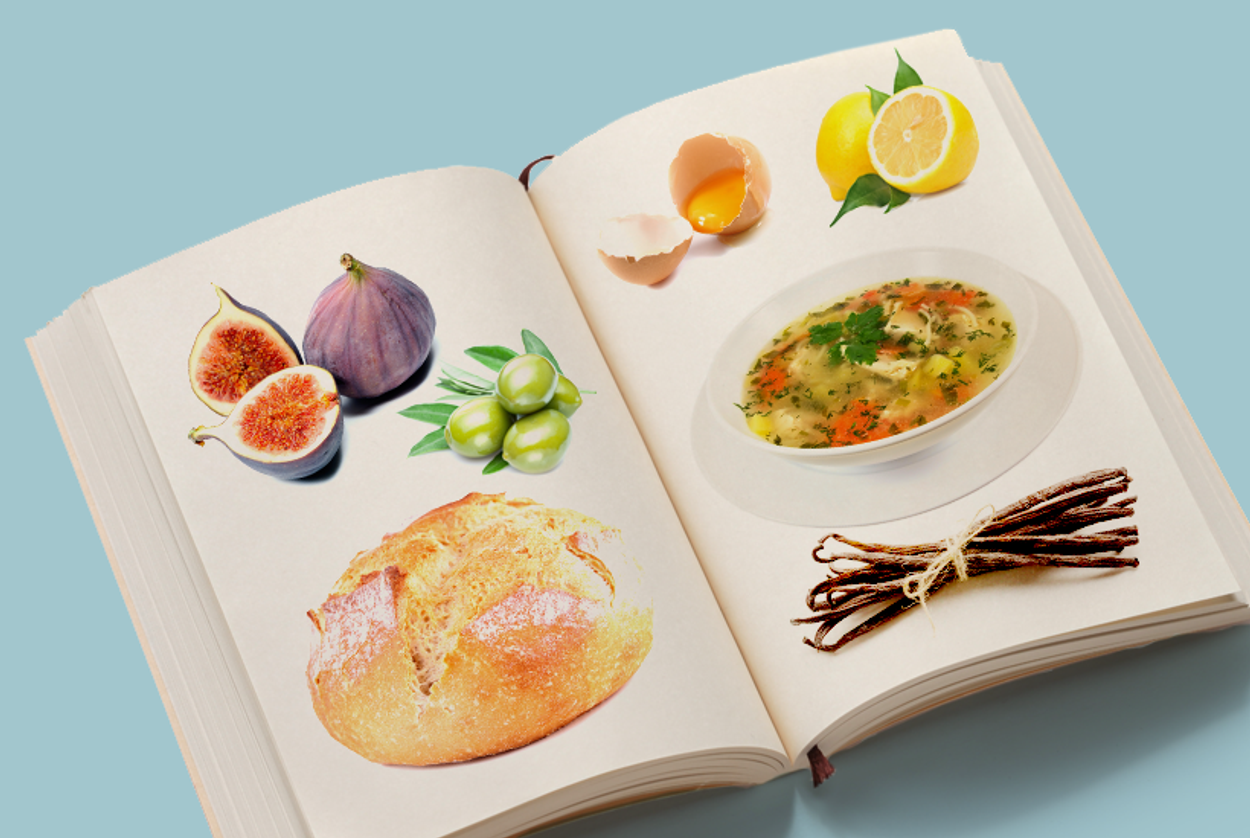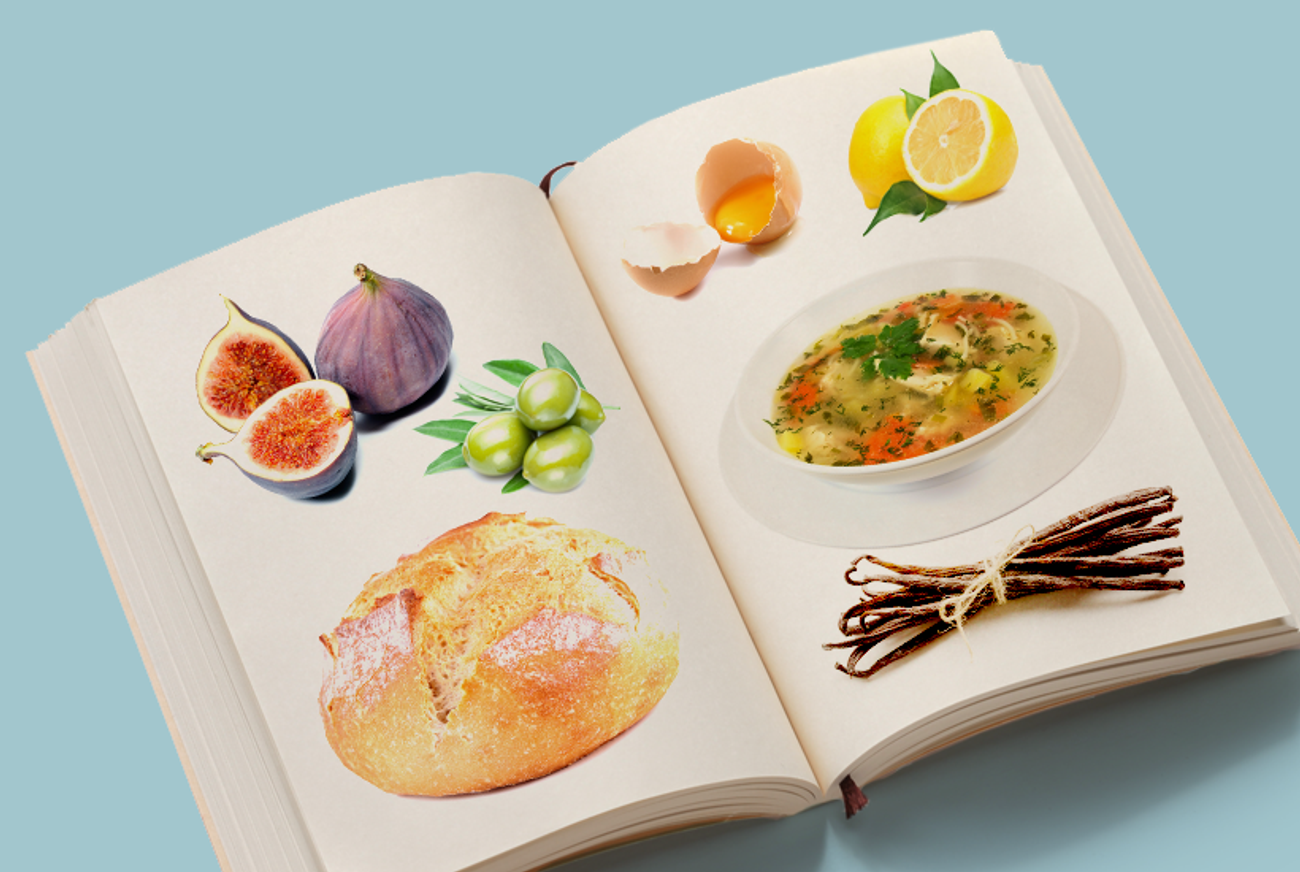A Literary-Culinary Connection: Dishes Inspired by Israeli Novelists
A lecture series in Jerusalem cooks up recipes based on the work of Meir Shalev, Chaim Nachman Bialik, and others




“Food is a basic thing, an integral part of any literary character’s life. It’s only natural to describe it in books,” Gil Hovav told me before the first meeting of a three-part lecture series in Jerusalem called Culinary Love Affair. The series is focused on Jewish food as it is portrayed in Israeli fiction as well as in the literature of the Diaspora before Israel was established, and its title is actually a play on words, since in Hebrew the term for “love affair”—roman—also means “novel.”
Cultural center Beit Avi Chai invited two of the most recognizable faces in Israel’s culinary world to host this series: Hovav, who is a culinary journalist, TV personality, and cookbook writer; and celebrity chef Nir Zook. The lectures take place at the Culinary Bazaar that Zook himself initiated at The First Station —Jerusalem’s old train station, originally built 120 years ago and recently converted into a plaza for culture, food, and leisure.
Hovav says the series is aimed at lovers of language rather than foodies: “The target audience is not fans of cooking-reality TV. It is people who love the Hebrew language, who love literature and culture. For me, food is not the main thing here.”
The first meeting, which took place at the beginning of March, was called “Stonemason’s Sandwich and Zabaione,” referring to two dishes described in books by Meir Shalev, the writer to whom the first event was dedicated. A stonemason’s sandwich is a loaf of bread with its insides emptied and filled with a mixture of salty cheese, olives, tomatoes, olive oil, garlic, and parsley. It is wrapped in nylon or greaseproof paper and placed under a wooden board, which the person who will eventually eat it has to sit on for a few hours. That’s what the Arab stonemasons of yesteryear-Jerusalem ate for lunch, and it is probably the most famous of Shalev’s literary recipes. It even made it to the menus of several restaurants after Shalev had written about it in his book Alone in the Desert.
“I read about this in Alone in the Desert and I also remember seeing this as I child growing up in Jerusalem,” Hovav told me. “This kind of sandwich has different names in different countries. Someone once told me that in France it is called a ‘train sandwich’ because commuters sit on their sandwich on the train in order to ‘cook’ it under the warmth of their bottoms on their way to work, and sometimes it is also named a ‘synagogue sandwich’ because people sit on it during prayer and eat it afterward. Zabaione, on the other hand, is an Italian dessert, made with egg yolks and a sweet wine. It is described in a very sensual fashion in Shalev’s Four Meals.”
For Hovav, opening the series with Shalev was the obvious choice: “He is very well-known for his sensual approach to food. He is also very popular and accessible, which makes him ideal for the first meeting.”
And indeed the first meeting was a success. The venue, which holds up to 80 people, was full. In the first hour Hovav talked about Shalev and about food. He read from Shalev’s books and filled the room with tasty anecdotes and laughter.
Talking about the interview he did with Shalev in 1988 when the author’s first book, The Blue Mountain, came out, Hovav told the audience that all those years ago, he asked the new star of Israeli literature (Shalev had only recently crossed over from journalism to fiction) when it dawned on him that he was really becoming a novelist. According to Hovav, Shalev answered with a food metaphor: “The moment I really got it was when, in the middle of writing the book, I decided to print out what I’ve written so far.” This was back in the day of dot matrix printers, Hovav pointed out, when all the pages came out connected to each other. “I pressed ‘print’ and a giant noodle came out of the printer,” Shalev told Hovav. “A giant noodle of 80,000 words. I looked at it in panic and thought: Who is going to eat so much pasta?”
In the second hour, on a stage that looked like a cooking show, Zook demonstrated how to cook different dishes inspired by Shalev’s writings and let the audience taste his creations: Zook strained yogurt through a white cloth and made labneh; he whisked egg yolks and made zabaione; he irrigated the audience with lemonade spiced with green hot peppers, and much more.
After spending two hours in Shalev’s culinary world—as seen through the eyes of two famous fans—each audience member received a booklet to take home, including food-related quotes from Shalev’s books, as well as an assortment of Zook’s Shalev-inspired recipes.
***
Shalev wasn’t aware of Culinary Love Affair until I told him about it. “There’s nothing new about the fact that people are discussing the food in my books,” he said. “It has already been discussed in cooking courses and written about quite a lot. Four Meals won two international prizes dedicated to food-descriptions in literature. One was awarded at a big culinary competition in France, usually dedicated to cookbooks, and the other was awarded by an Italian association from Chiavari, a town near Genoa. It is called Pedale e Forchetta—‘the pedal and fork society’—and made up of a few nice guys who love bicycles and good food.”
But describing food in a book isn’t the same as cooking it yourself. “In Alone in the Desert there is a very accurate recipe for chicken soup,” Shalev told me. “That’s one of the things I know how to make myself; I make great chicken soup. In Esau there is a lot of bread-baking, although I don’t bake. My brother bakes wonderfully but I don’t know how to. And in my last book, Two She-Bears, I explain how to make limoncello. That’s also something I make at home. The only two things from my books that I know how to make are chicken soup and limoncello. I know how to make other things, too, but they aren’t described in my books. I’m not really a cook, but I make a perfect fried egg, I make some decent pastas, I grill fish, and I make Israeli salad. That’s it—nothing too complicated.”
I was curious if Shalev, not being a cook himself, consulted anyone before attempting to describe all these different cooking techniques in his work. “Yes, when I wrote Esau I visited small bakeries in Jerusalem to see how they make the bread. And in other cases I talked to chefs like Eyal Shani and the wonderful Leon Alkalai. When I wrote Four Meals I consulted chef Zachi Bukshester, who showed me how to make zabaione. What attracted me to zabaione is the richness and lack of shame. The use of egg yolk, sugar, and wine seemed so enchantingly shameless to me. Nowadays people tend to cook in an apologetic kind of way—they cook with less calories, less things that are bad for you, less meat, etc. There seems to be a constant concern for your health and your morals. People forget that food is supposed to bring you pleasure, and pleasurable things are sometimes a little bad for you.”
One of the recipes in Zook’s booklet from the Shalev lecture was for fig carpaccio in goat’s-yogurt sauce and vanilla oil. When I told Shalev about it, he didn’t really see the connection. “I can’t imagine a recipe that’s further away from my books or from my table,” he said. “I’d prefer to take a fig and just eat it. It’s such a delicious fruit! The only thing you can do to improve its taste is to trickle two drops of Arak on it.”
***
The next meeting in the series, which will take place on March 26, is about food in the writings of Chaim Nachman Bialik. “Bialik is in my opinion the greatest glutton in Hebrew literature,” Hovav explained. “Knight of Onions and Knight of Garlic is a classic any way you look at it: the humor, the rhyming, the linguistic richness, and also the food.”
While Hovav no doubt has already dived head-first into Bialik’s culinary world in preparation, Zook prefers to work spontaneously: “I like these meetings to be very intuitive,” Zook told me. “I read a bit right before the meeting, I see how I feel and decide what to cook. I wrote the recipes for the booklets beforehand but those are not necessarily the recipes I demonstrate before the audience at the event itself.”
Zook admits that Bialik was a less exciting choice for him than Shalev: “I can’t exactly say that the thought of cooking according to Bialik filled me with vibrations. The way he describes food doesn’t stimulate me like Shalev’s food descriptions, but my luck is that I can think about the man and the era and create my own excitement. I don’t know what I’m going to make next time yet. All I know is that I’m going to do all sorts of things with garlic and onions.”
Since the series takes place in Jerusalem, Hovav and Zook felt it’s only natural to dedicate the final meeting, which will take place on April 23, to food in books about Jerusalem. That meeting is titled “Kubaneh and Bourekas,” referring to the Yemenite bread, which is baked all night in a tightly covered dish and prepared for Shabbat breakfast/brunch, and the popular flaky pastries. The event will focus on the writings of Dan Benaya Seri, Simcha Siani, and Yossi Banai, among others.
“Our third meeting is a tribute to Jerusalem,” said Hovav, who was born and raised in the city. “This is where the series takes place, and I assume that a large part of the audience is from Jerusalem, so we’re essentially talking about our audience.”
For Zook, too, Jerusalem isn’t far from his heart: “I was born and raised in Moshav Kfar Warburg, and since 1998 I’ve been living in Jaffa, close to my restaurant Cordelia, but when I was 18 I lived for a year in Nachlaot in Jerusalem. I was so busy working in a restaurant and drinking Arak that I don’t remember a lot from that time, but I spend a lot of time in Jerusalem now, too. In fact, since I initiated the Culinary Bazaar, which opened last August, I am in Jerusalem every day. I haven’t decided yet what I’ll make in the meeting about Jerusalem literature, but I’m guessing I’ll make some variation on the theme of kubbeh.”
With one meeting done, two to go, and endless literary delicacies left untasted, the hosts are already making plans for possible future events. “If this series will continue,” Hovav told me, “Agnon and Tchernichovsky with his levivot (latkes or vegetable fritters) are certainly next in line.”
***
Like this article? Sign up for our Daily Digest to get Tablet Magazine’s new content in your inbox each morning.
Dana Kessler has written for Maariv, Haaretz, Yediot Aharonot, and other Israeli publications. She is based in Tel Aviv.
Dana Kessler has written for Maariv, Haaretz, Yediot Aharonot, and other Israeli publications. She is based in Tel Aviv.